The Standing Committee of the National People’s Congress (NPCSC) voted on and passed The NPCSC’s interpretation of the Basic Law Article 104 of the Hong Kong Special Administrative Region with unanimous support on Monday morning.
Follow HKFP Live for reactions and updates.
The announcement marks the fifth time since the 1997 handover that Beijing has interpreted Hong Kong‘s mini-constitution.

Explainer & Timeline: The oath fallout and Beijing’s intervention in Hong Kong’s mini-constitution
Article 104 stipulates: “When assuming office, the Chief Executive, principal officials, members of the Executive Council and of the Legislative Council, judges of the courts at all levels and other members of the judiciary in the Hong Kong Special Administrative Region must, in accordance with law, swear to uphold the Basic Law of the Hong Kong Special Administrative Region of the People’s Republic of China and swear allegiance to the Hong Kong Special Administrative Region of the People’s Republic of China.”
Details of the ruling remain unclear. However, lawmaker Martin Liao Cheung-kong, also an NPC member, said the interpretation will say the oath administrator, the Legislative Council’s secretary-general, will have the power to decide if an oath is valid. He said lawmakers may not be able to retake their oaths if they did not take it solemnly.
“I do not think this time that the boundary [of power] of the NPC interpretation was crossed,” he said.
Update: ‘Protect the rule of law’: Beijing defends ruling that effectively bans pro-independence politicians
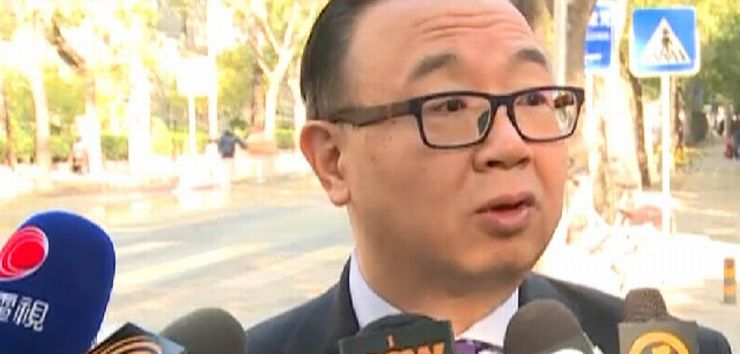
Liao said it was better to have the interpretation before the court ruling, so that the court can follow the interpretation in the ruling.
As per Article 158(1) of the Basic Law, the NPCSC’s opinions are final and binding.
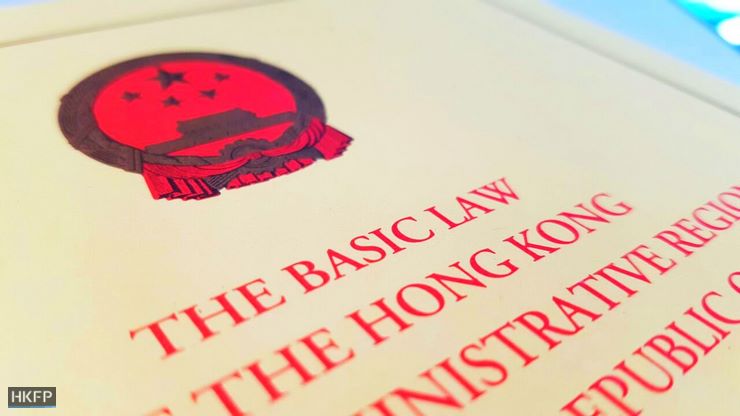
Basic Law committee chair Li Fei told reporters that some “lawmaker-elects” did not take their oaths solemnly but used the ceremony to act against the Basic Law.
He said some insulted the country at the swearing-in ceremony. “The ugly act… attracted strong condemnation from Chinese people worldwide,” he said. “It will strongly hurt the country’s unity and interests if it is not dealt with seriously,” he claimed.
The oaths which democratically-elected Youngspiration lawmakers Sixtus “Baggio” Leung Chun-hang and Yau Wai-ching took in the legislature last month were deemed derogatory and an insult to China by some. Their actions triggered a legal challenge by the government and a ruling from Beijing. In an unprecedented move, the interpretation came before any judgement was passed in an ongoing lawsuit.
Thousands protested ahead of the ruling on Sunday, saying Beijing’s move amounts to interference in the city’s judiciary. Violent scenes erupted as some protesters proceeded to the China Liaison Office in Sheung Wan. Police deployed pepper spray and made four arrests.
Complete coverage and analysis on HKFP:
- LIVE: Beijing intervenes in Hong Kong oath row, makes rare ruling to block pro-independence lawmakers
- Youngspiration duo are ‘cancer cells,’ says China Liaison Office director
- The basics: Five facts about the political crisis facing Hong Kong
- ‘Protect the rule of law’: Beijing defends ruling that effectively bans pro-independence politicians
- Hong Kong gov’t to ‘fully implement’ Beijing’s ruling on oath-taking row, says Chief Exec. CY Leung
- 4 arrested and 2 police injured in late-night protest over Basic Law interpretation
- Video: Taiwanese animators hand down colourful interpretation of Hong Kong’s oath-taking saga
- ‘Massive uncertainty’: Civic Party slams Beijing for rewriting Basic Law in the name of interpretation
- Beijing passes unanimous ruling effectively banning pro-independence lawmakers from Hong Kong legislature
- Explainer & Timeline: The oath fallout and Beijing’s intervention in Hong Kong’s mini-constitution

Timeline: What has happened so far.
Oct 11: The government says that lawmakers who decline or neglect to take their oath will be disqualified in accordance with Section 21 of the Oaths and Declarations Ordinance.
Oct 12: Youngspiration’s Yau Wai-ching and Baggio Leung Chung-hang take their oaths at the Legislative Council, referring to China as “Chee-na,” which some consider offensive. The Legislative Council Secretariat rejects the duo’s oaths.
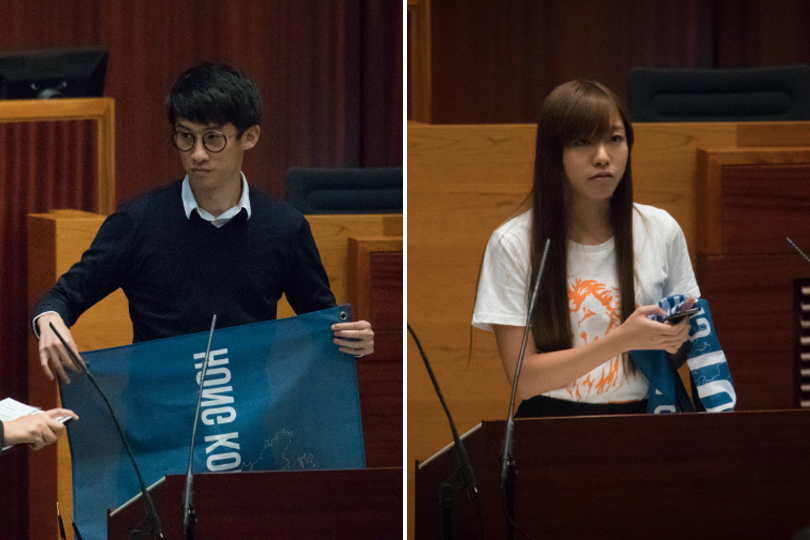
Oct 18: Legislative Council President Andrew Leung invites lawmakers whose oaths were rejected to make a written request to re-take their pledges.
Oct 18: The Youngspiration lawmakers request to re-take their oaths.
Oct 18: Chief Executive Leung Chun-ying and the Department of Justice file an emergency judicial review against Andrew Leung’s decision to allow them to re-take the oath. They also request an interim injunction to bar Leung from administering the oath. The court grants leave for the judicial review but refuses to issue an interim injunction.
Oct 18: Andrew Leung objects to the government’s interference in the oath row.

Oct 19: Pro-Beijing lawmakers stage a walkout to prevent Yau and Leung from being sworn-in.
Oct 25: Andrew Leung decides to defer the re-taking of oaths by the Youngspiration lawmakers until the government’s judicial review challenge is concluded.
Oct 26: The pro-democracy camp demands Andrew Leung step down after he backtracked on his position on the oath controversy.
Nov 3: The High Court begins hearing the judicial review challenge.

Nov 3: Beijing notifies the Hong Kong government that it will discuss handing down an interpretation of Article 104 of the Basic Law at the Standing Committee of the National People’s Congress (NPCSC) meeting.
Nov 7: Beijing’s interpretation is expected.
Nov 8: Hong Kong’s lawyers to hold a silent march in protest of Beijing’s decision. This is the fourth silent march organised by the legal sector since the 1997 handover.
What provision in the Basic Law is in question?
Beijing will be discussing whether to interpret Article 104 of the Basic Law.
The provision stipulates: “When assuming office, the Chief Executive, principal officials, members of the Executive Council and of the Legislative Council, judges of the courts at all levels and other members of the judiciary in the Hong Kong Special Administrative Region must, in accordance with law, swear to uphold the Basic Law of the Hong Kong Special Administrative Region of the People’s Republic of China and swear allegiance to the Hong Kong Special Administrative Region of the People’s Republic of China.”
HKU law professor Johannes Chan and legal sector lawmaker Dennis Kwok have said that Article 104 is clearly written and has little room for interpretation.
Some argue that Beijing’s interpretation of Article 104 will also affect the chief executive, principal officials, judges and other members of the judiciary. In other words, judges can also be disqualified if they do not swear allegiance to Hong Kong properly.
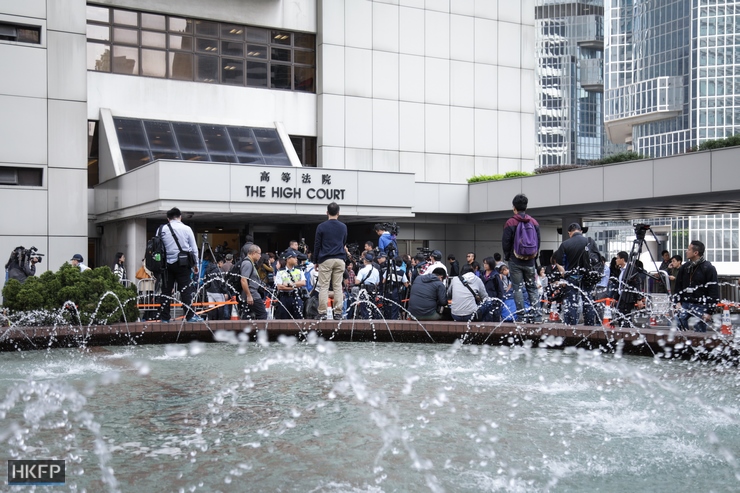
What is an interpretation of the Basic Law?
Article 158(1) of the Basic Law confers the power of interpreting Hong Kong’s mini-constitution on China’s top legislative body, the Standing Committee of the National People’s Congress (NPCSC). In other words, the NPCSC’s opinions are final and binding.
An NPCSC interpretation – which has happened on four occasions since the 1997 handover – is always controversial owing to the public perception that Beijing is undermining Hong Kong’s judicial independence.

What is the scope of Beijing’s interpretive power and when can they intervene?
Hong Kong’s judiciary has debated the scope of the NPCSC’s interpretive power. In Ng Ka Ling v. Director of Immigration in 1999, the Court of Final Appeal – Hong Kong’s final appellate court – took a strong stance in defending judicial autonomy.
But the Court issued a clarification at the government’s request a month later, saying that it “accepts that it cannot question [the] authority” of the NPCSC. It did, however, subtly add that the authority pertains to acts that are in accordance with the Basic Law and the procedure stated in the mini-constitution.
Almost a year later, in Lau Kong Yung v. Director of Immigration, the Court of Final Appeal acknowledged that the NPCSC’s power under Article 158(1) is “in general and unqualified terms,” meaning that it can interpret the Basic Law at anytime.
The Court also quoted legal scholar Yash Ghai, who wrote that Beijing’s interpretive power is “plenary in that it covers all the provisions of the Basic Law” and that it “may be exercised in the absence of litigation.” The Court did not reject this analysis.
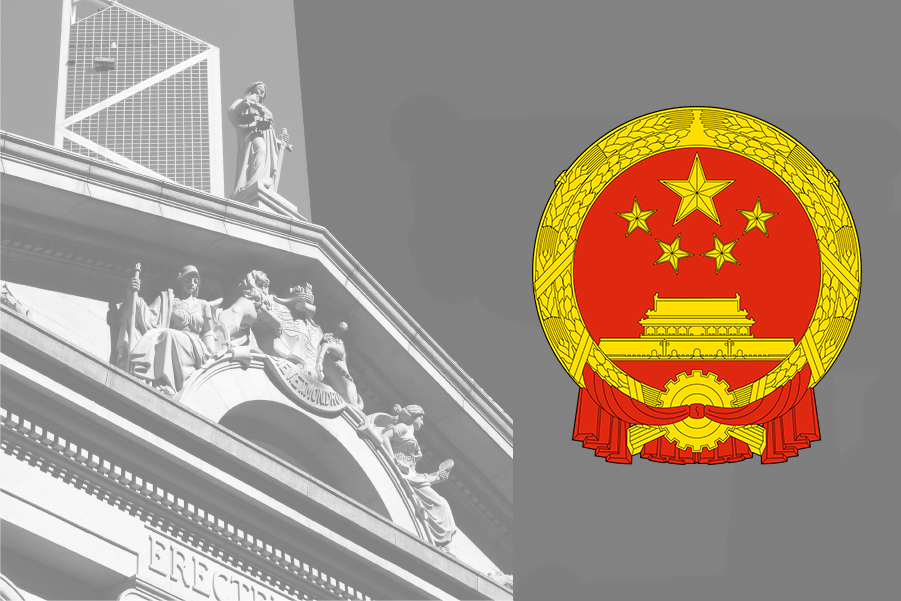
Is there any precedent for Beijing interpreting the Basic Law?
There have been four NPCSC interpretations since the 1997 handover.
The first interpretation took place in 1999, in the case of Ng Ka Ling v. Director of Immigration. The Hong Kong government asked Beijing to interpret Article 24 of the Basic Law after the Court of Final Appeal handed down a ruling entitling all Chinese citizens with Hong Kong parents to the right of abode.
The government made the request again in 2005, regarding the term of office of chief executives when replacing predecessors who vacate office before their terms expire.

The NPCSC has interpreted the Basic Law on its own initiative once. The interpretation, issued in 2004, concerned the election procedure for choosing the chief executive.
In 2011, the Court of Final Appeal referred the case of Democratic Republic of the Congo v. FG Hemisphere to the NPCSC over the issue of state immunity.
All of the interpretations sparked controversy in Hong Kong society. The legal profession in the territory held two silent marches in protest of the 1999 and 2005 interpretations.
